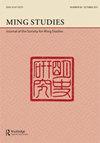Humanity may Triumph over Heaven. Wang Tingxiang’s Natural Philosophy in its Historical Context
IF 0.3
0 ASIAN STUDIES
引用次数: 0
Abstract
This paper examines Wang Tingxiang’s natural philosophy within its historical context. Wang left numerous accounts on natural phenomena in which he sought to discover the causes or hidden mechanisms of the processes he uncovered. To this end, he first had to radically deconstruct the so-called correlative thinking that perceives a fundamental connection between humanity and the natural world. Wang deemed this worldview a critical blockage of his scholarly aim and instead articulated his empirical stance as an alternative pathway. In this sense, he emphasized the sensory data gathered from direct observations as the only legitimate source of natural knowledge. With such data, aided by the human faculty of thinking, one could eventually uncover the principles that underpin natural phenomena. Further, it is crucial to understand why and in what context Wang proposed this empirical stance. To answer this question, I highlight the environmental crisis associated with the Little Ice Age that resulted in numerous natural disasters during Wang’s time. In order then to overcome such disasters, Wang emphasized the accurate understanding of natural phenomena so that people could predict future outbreaks of such disasters, thereby preventing the (re)occurrence of potential harms. Although Wang’s worldview enjoyed little to no popularity in his time, a similar empirical strand re-emerged and garnered greater attention as the environmental crisis grew more severe during the seventeenth century.人类可能战胜上天。历史语境中的王庭祥自然哲学
本文将王庭祥的自然哲学置于其历史背景中加以考察。王留下了许多关于自然现象的描述,他试图发现他所发现的过程的原因或隐藏机制。为此,他首先必须从根本上解构所谓的关联思维,这种思维认为人类与自然世界之间存在着根本的联系。王认为这种世界观严重阻碍了他的学术目标,并将他的经验主义立场作为另一种途径。在这个意义上,他强调从直接观察中收集的感官数据是自然知识的唯一合法来源。有了这些数据,在人类思维能力的帮助下,人们最终可以揭示支撑自然现象的原理。此外,理解王提出这一实证立场的原因和背景至关重要。为了回答这个问题,我强调了与小冰期相关的环境危机,在王的时代导致了许多自然灾害。为了克服这些灾害,王强调了对自然现象的准确理解,以便人们能够预测未来这些灾害的爆发,从而防止潜在危害的(再次)发生。尽管王的世界观在他的时代几乎不受欢迎,但在17世纪,随着环境危机的日益严重,类似的经验主义观点重新出现,并引起了更大的关注。
本文章由计算机程序翻译,如有差异,请以英文原文为准。
求助全文
约1分钟内获得全文
求助全文

 求助内容:
求助内容: 应助结果提醒方式:
应助结果提醒方式:


